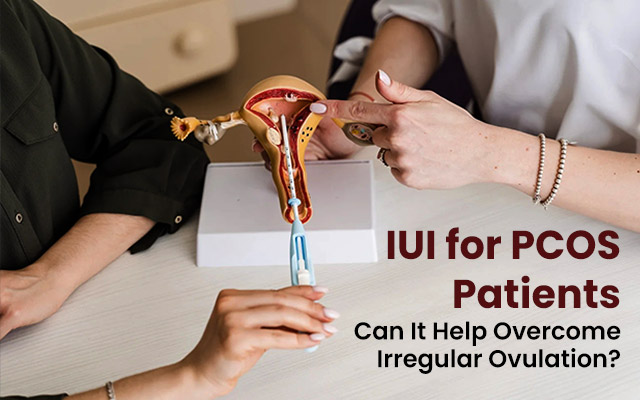November 19, 2025 | by Admin

Polycystic Ovary Syndrome (PCOS) is one of the leading causes of infertility in women. Many face irregular ovulation, which makes conceiving naturally difficult. That’s where IUI offers hope.
If you are searching for a trusted IUI clinic in Kolkata, this blog explains how IUI can help PCOS patients overcome ovulation challenges and improve fertility outcomes.
PCOS affects hormone levels, causing irregular or absent ovulation. Without regular ovulation, the chances of natural conception drop significantly. Women often experience unpredictable menstrual cycles and poor egg release. Effective PCOS ovulation treatment focuses on stimulating regular ovulation and improving egg quality for conception.
IUI(Intrauterine Insemination) is a simple fertility treatment. It involves placing prepared sperm directly into the uterus during ovulation. This process increases the chances of sperm meeting the egg. The IUI procedure steps include ovulation induction, monitoring follicle growth, and timed insemination.
Doctors recommend IUI for PCOS because it addresses ovulation irregularities. Ovulation induction medications help release mature eggs, while IUI ensures that high-quality sperm reach them at the right time. Together, they improve conception rates and reduce waiting time compared to natural cycles.
The IUI success rate in PCOS patients depends on age, weight, and hormone balance. On average, the success rate ranges between 15% and 25% per cycle. When combined with medication and lifestyle changes, results improve significantly. Regular monitoring during cycles also increases accuracy and timing.
Medications stimulate ovulation and regulate hormonal imbalance. Below are the common drugs used:
Clomid for PCOS helps trigger ovulation by stimulating the ovaries to produce mature eggs. It’s often used as the first line of treatment for IUI.
Letrozole for PCOS is another effective drug. It increases the body’s natural production of follicle-stimulating hormone (FSH) to promote egg growth. It often works better in women resistant to Clomid.
Gonadotropins are injectable hormones used when oral medications fail. They directly stimulate the ovaries for multiple egg development, increasing the chances of success.
Monitoring plays a vital role in ovulation induction for PCOS. Ultrasound scans track follicle growth, while hormone tests determine the best insemination time. Doctors perform IUI precisely during ovulation to maximise success rates.
IUI is safe, but mild side effects like bloating or cramps may occur. Overstimulation of the ovaries can lead to multiple pregnancies, so monitoring is essential. Choosing an expert fertility specialist ensures safety and success.
If IUI doesn’t work after several cycles, IUI vs IVF for PCOS becomes the next discussion. IVF offers higher success rates but is more expensive and invasive. The fertility doctor will recommend the best step based on your case.
Lifestyle changes support PCOS infertility solutions and improve IUI outcomes. Maintain a healthy weight, eat balanced meals, manage stress, and exercise regularly. These habits improve hormone balance and ovulation consistency.
IUI offers a realistic path to parenthood for women with PCOS. It helps regulate ovulation and increases conception chances safely and effectively. However, the success of PCOS fertility treatment depends on expert care, accurate timing, and lifestyle management.
If you’re ready to take control of your fertility, visit Petals Family Clinic, a trusted IUI clinic in Kolkata. The clinic’s fertility specialists personalise every IUI cycle using advanced technology and compassionate care. Book your consultation today and take the first confident step toward parenthood.
Yes, IUI with ovulation induction improves egg release and conception chances.
Doctors usually suggest three to six cycles before considering IVF.
IUI works well initially, but IVF offers higher success for resistant cases.
Clomid, Letrozole, and Gonadotropins effectively stimulate ovulation.
Maintain a healthy lifestyle, follow the doctor’s plan, and track ovulation regularly.